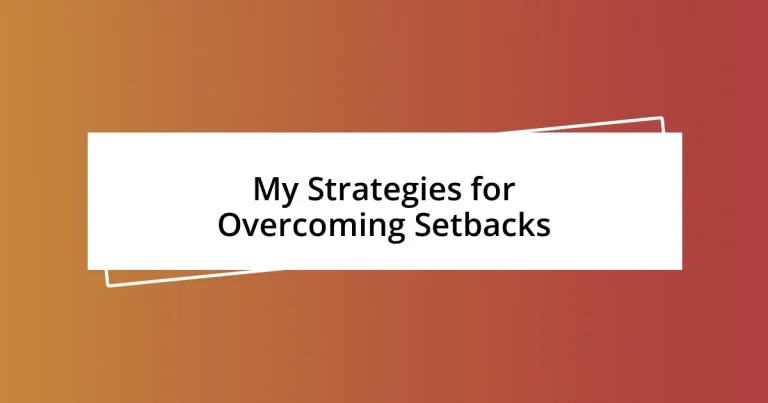Key takeaways:
- Setbacks are opportunities for growth and learning; they encourage self-reflection and resilience.
- Recognizing emotional responses to setbacks (frustration, sadness, anger, confusion, self-doubt) helps in processing feelings more effectively.
- Building a strong support network and setting achievable recovery goals can significantly enhance one’s ability to overcome challenges.

Understanding Setbacks in Life
Life is a series of ups and downs, and setbacks can often feel like the ground has shifted beneath us. I remember a time when I missed out on a big promotion I had been working toward for months. It left me questioning my worth and abilities, sparking a wave of self-doubt that was hard to shake off.
Setbacks can be emotionally charged; they often stir feelings of frustration, sadness, and even anger. Have you ever felt that way? I know I have, especially when it feels like you’re doing everything right but still hitting walls. It’s essential to recognize that these feelings are part of the process and that it’s okay to take a moment to grieve what didn’t go as planned.
At the core, setbacks are opportunities wearing disguises. They challenge us to adapt and grow. Each setback I’ve encountered has taught me something valuable, whether about myself or my goals. So, instead of viewing them solely as failures, I try to ask myself: what lessons can I extract from this experience? This shift in perspective can be transformational.
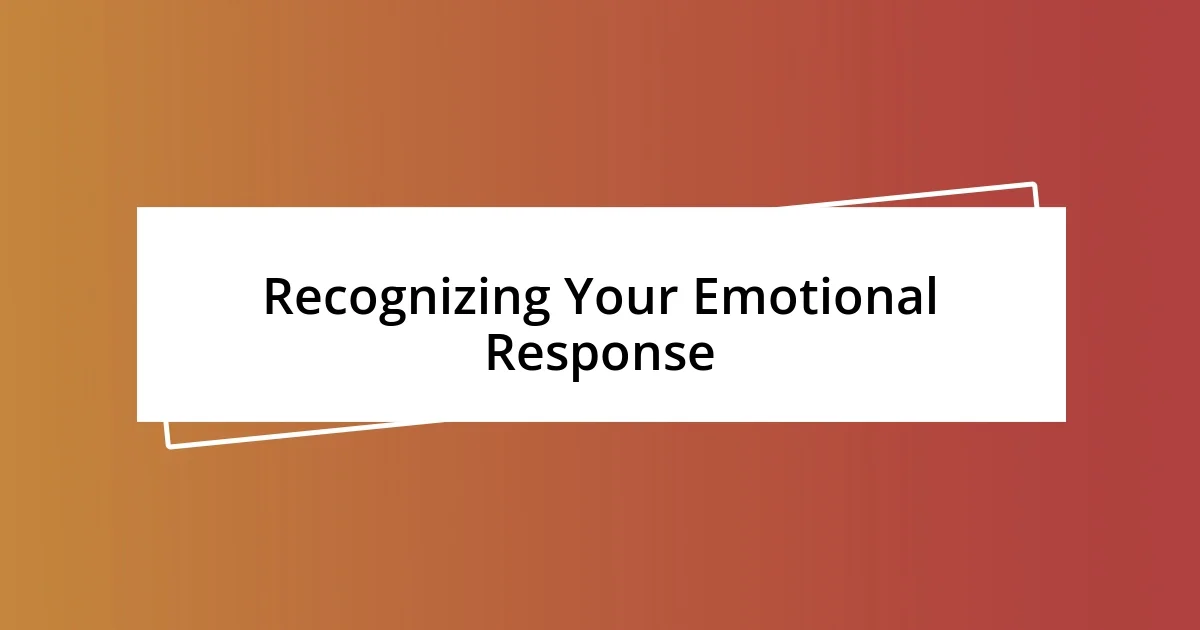
Recognizing Your Emotional Response
Recognizing your emotional response to setbacks is a crucial step in navigating through them. I remember a time when I received critical feedback after a presentation I had poured my heart into. My initial reaction was a surge of defensiveness and heartache; it was an emotional rollercoaster. In those moments, it helped to pause and identify what I was feeling—anger, disappointment, and even embarrassment. This awareness allowed me to process my emotions more clearly instead of being overwhelmed by them.
When we acknowledge our feelings, we empower ourselves to move forward. Here are some emotional responses you might recognize in yourself:
- Frustration: A common reaction when things don’t go as planned.
- Sadness: It’s natural to feel a sense of loss after missing an opportunity.
- Anger: Often directed at circumstances or ourselves.
- Confusion: A sense of being lost or unclear on the next steps.
- Self-doubt: Questioning our abilities and decisions.
Each of these emotions is valid and signals that it’s time to reflect and reassess your path.
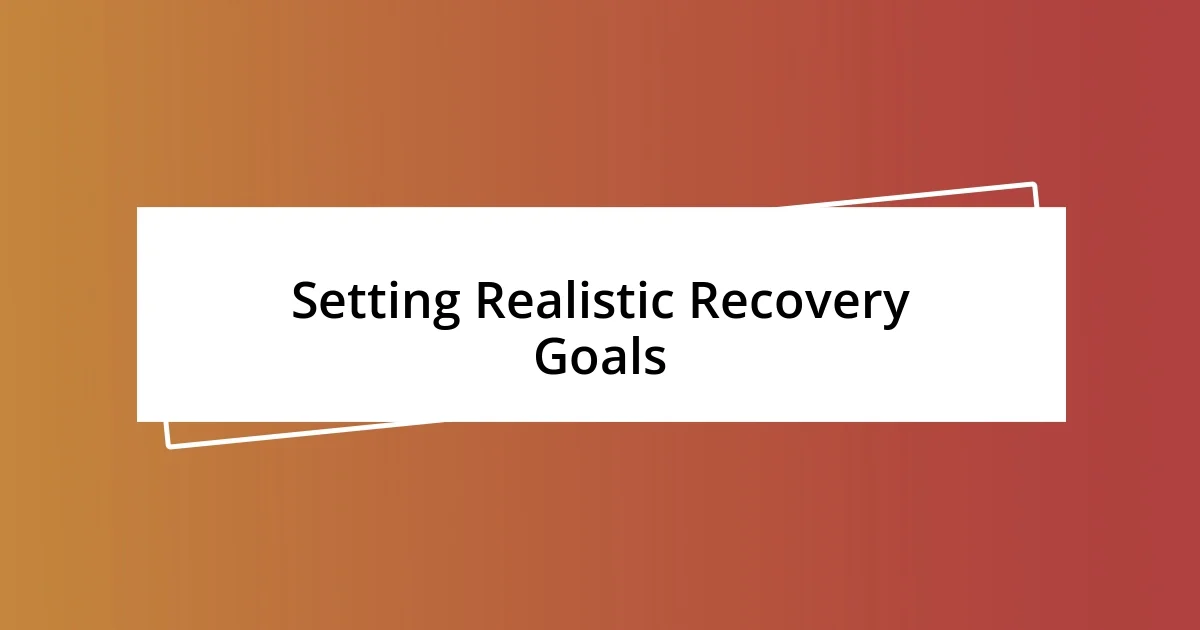
Setting Realistic Recovery Goals
Setting realistic recovery goals is crucial when navigating through setbacks. I’ve learned that breaking down larger objectives into smaller, manageable goals can make the recovery process feel less daunting. For instance, after facing a professional disappointment, I decided to focus on enhancing a particular skill rather than aiming immediately for the next promotion. This approach helped me regain my confidence and provided clear direction.
It’s also essential to ensure that these goals are measurable and time-bound. During a challenging period in my life, I set a goal to read one book related to personal development each month. This goal was realistic and specific, allowing me to track my progress. By achieving these incremental goals, I felt a sense of accomplishment that fueled my motivation to tackle bigger challenges ahead.
Finally, I find that sharing my recovery goals with a trusted friend or mentor can provide additional accountability. Recently, I confided in a colleague about my intentions to network more actively within my industry. Their encouragement and support not only kept me on track but also opened doors to new opportunities, proving that teamwork can be beneficial during personal recovery journeys.
| Goal Type | Description |
|---|---|
| Short-term Goals | Achievable objectives set to boost immediate confidence. Example: Attend a workshop in the next month. |
| Long-term Goals | Broader aspirations that require more time and effort. Example: Obtain a certification in my field within the year. |
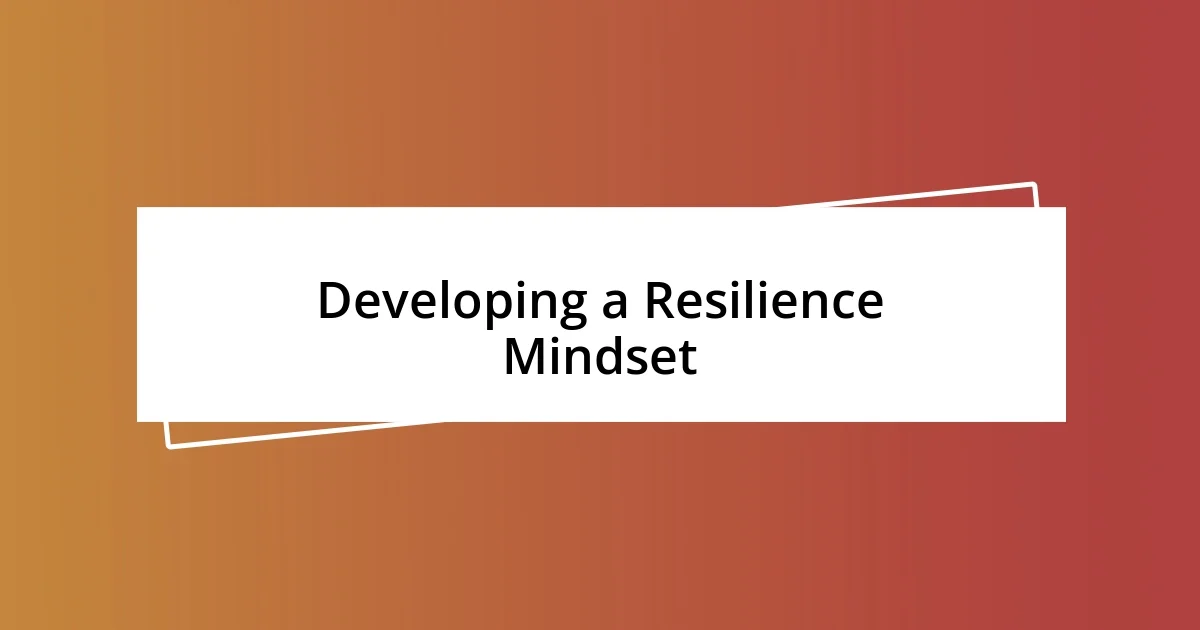
Developing a Resilience Mindset
Embracing a resilience mindset often starts with a shift in perspective. I remember a time when I faced a significant setback at work, and my first instinct was to dwell on what went wrong. Instead, I challenged myself to focus on what I could learn from the experience. Isn’t it interesting how reframing setbacks as learning opportunities can ignite new growth? By doing this, I transformed my initial disappointment into actionable insights that ultimately helped me improve my skills.
The importance of self-compassion cannot be overstated in cultivating resilience. I once struggled with a personal failure that left me feeling defeated and harshly critical of myself. It took time, but I learned to treat myself with the same kindness I would offer a friend in a similar situation. This shift was eye-opening. I realized that recognizing my imperfections allowed me to develop a more compassionate and steady mindset, which was pivotal in bouncing back from future challenges.
Finally, surrounding myself with a supportive community has played a monumental role in building my resilience. I recall a particularly tough period where I confided in a group of friends about my struggles. Their encouragement and shared experiences reminded me that setbacks are part of life’s journey. Have you noticed how sharing vulnerabilities can create stronger connections? This realization reinforced my belief that we thrive together, making it easier to face obstacles head-on when we feel supported.
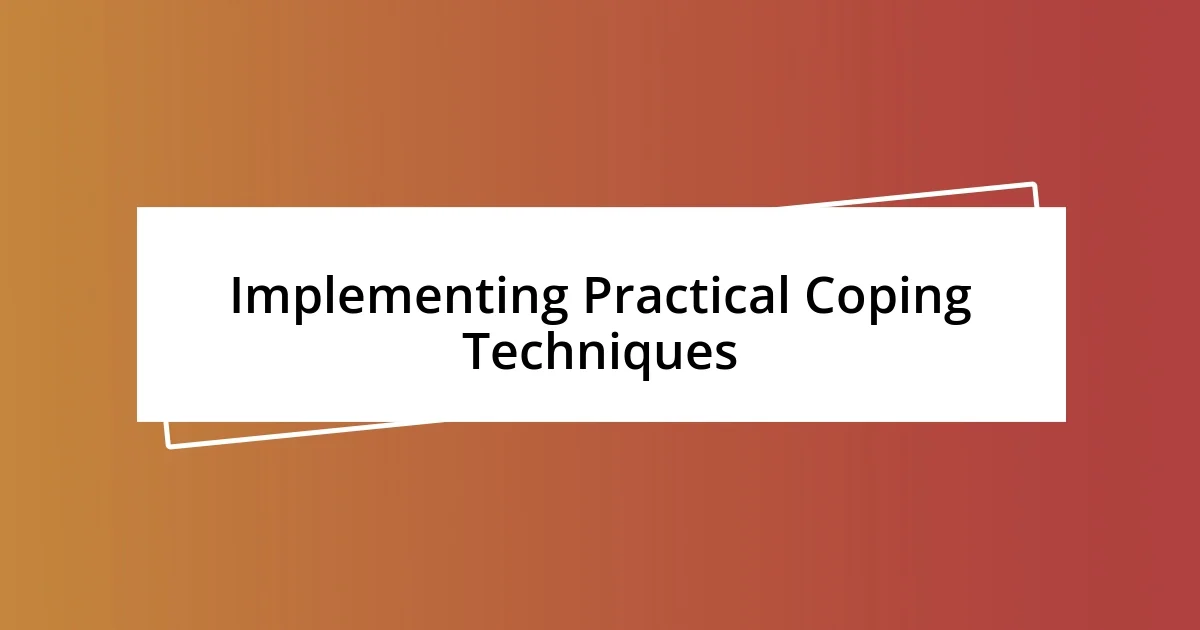
Implementing Practical Coping Techniques
Implementing practical coping techniques can be transformative during tough times. For instance, when I faced a particularly stressful period in my life, journaling became my go-to strategy. I started by dedicating just ten minutes each evening to reflect on my day, jotting down both my challenges and things that went well. This practice not only helped clear my mind but also revealed patterns I hadn’t noticed before. Have you ever tried writing down your thoughts? It can be remarkably clarifying.
Another method I found helpful is incorporating mindfulness into my daily routine. There were days when the weight of setbacks felt overwhelming, so I explored guided meditation apps that only required a few minutes of my time. One evening, I remember feeling so restless, but after just five minutes of focused breathing, I felt a wave of calm wash over me. It made me realize how beneficial those small breaks can be in regaining mental clarity. Have you considered how powerful breath can be?
Lastly, don’t underestimate the power of physical activity as a coping technique. I began taking short walks in nature whenever I felt stuck in a cycle of negative thoughts. I distinctly recall one afternoon, the fresh air and the sound of leaves crunching underfoot shifted my mindset entirely. It was as if each step shook loose my worries. Engaging in movement is not just good for the body; it can also be a potent antidote to stress. Have you thought about how little changes in your daily routine can lead to a more positive state of mind?
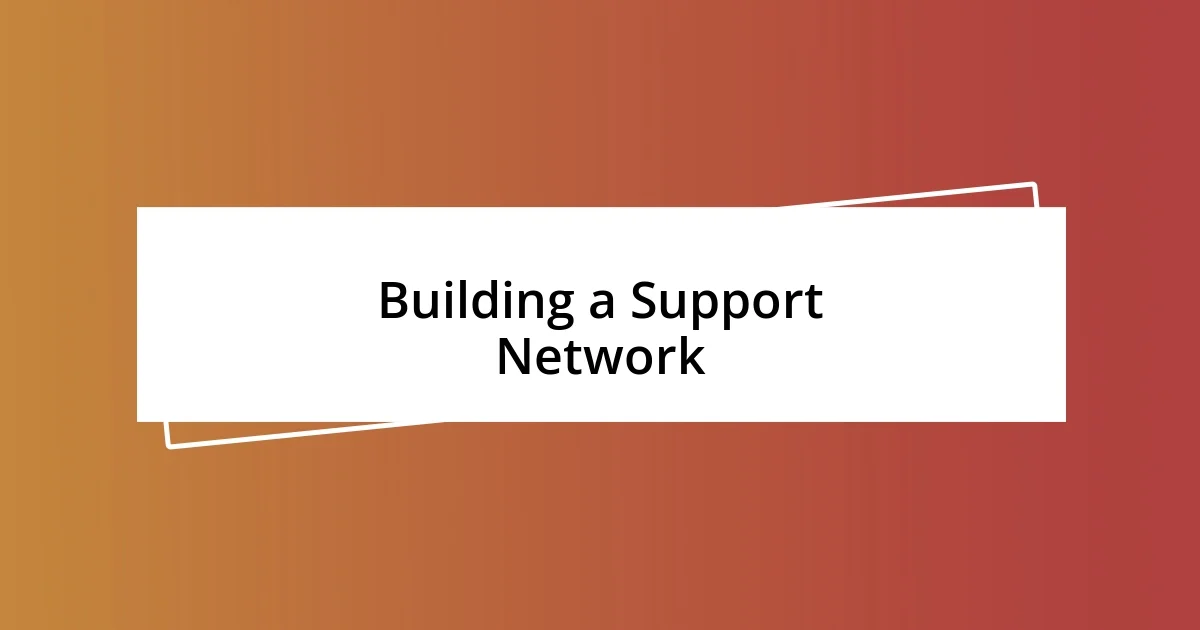
Building a Support Network
Building a support network is crucial for overcoming setbacks. I can’t emphasize this enough from my own experiences. A few years back, I faced a major personal crisis, and reaching out was the hardest part. I remember feeling so isolated, yet making that initial call to a friend felt like lifting a heavy weight off my shoulders. Have you ever felt that sense of relief when you finally open up to someone? It’s transformative.
Connecting with like-minded individuals can also be incredibly empowering. In my case, I joined a local group that focused on resilience and personal development. Hearing others share their challenges created a sense of camaraderie that was comforting. One member’s story about overcoming their own struggles resonated deeply with me, reminding me that I’m not alone in this journey. Isn’t it fascinating how collective experiences can foster a supportive environment?
Finally, I learned that the quality of relationships matters just as much as quantity. I once had a friendship that felt draining instead of uplifting. It took some time, but I realized I needed to surround myself with those who positively influenced my life. It’s amazing how a few genuine connections can enhance your ability to bounce back from setbacks. Who are the people in your life that lift you up? I encourage you to consciously build and nurture those relationships.
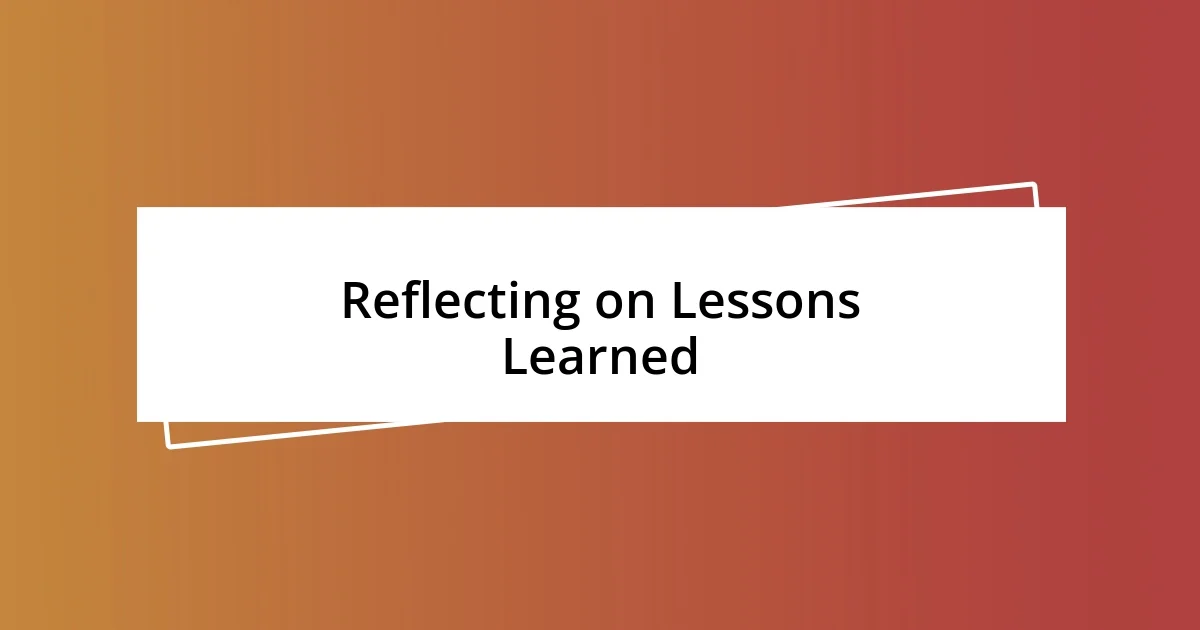
Reflecting on Lessons Learned
Reflecting on lessons learned can be a profound experience. I recall a setback in my career that initially felt crushing, but as I took the time to reflect, I realized it was a pivotal moment for growth. I vividly remember sitting in my favorite coffee shop, laptop open, and writing down every detail of what went wrong. In doing so, I discovered misconceptions I had about my own capabilities. Have you ever had a moment where reevaluating your experience illuminated your own strengths?
As I mulled over my challenges, I began to notice recurring themes and patterns in my responses to setbacks. There was a realization that my fear of failure had often kept me from taking risks, and that insight was both unsettling and empowering. I remember feeling a mix of embarrassment for not seeing it sooner and relief for finally understanding myself better. It made me wonder, have you ever considered how your instincts might sabotage your progress?
Each lesson brought with it a unique gift, like unearthing pieces of a puzzle that, when put together, helped form a clearer picture of who I am. One of the most startling revelations was the importance of resilience in the face of adversity; setbacks don’t define us; they refine us. I still find it comforting to reflect on those moments whenever challenges arise. Isn’t it remarkable how each difficult situation can serve as a stepping stone toward self-discovery?












